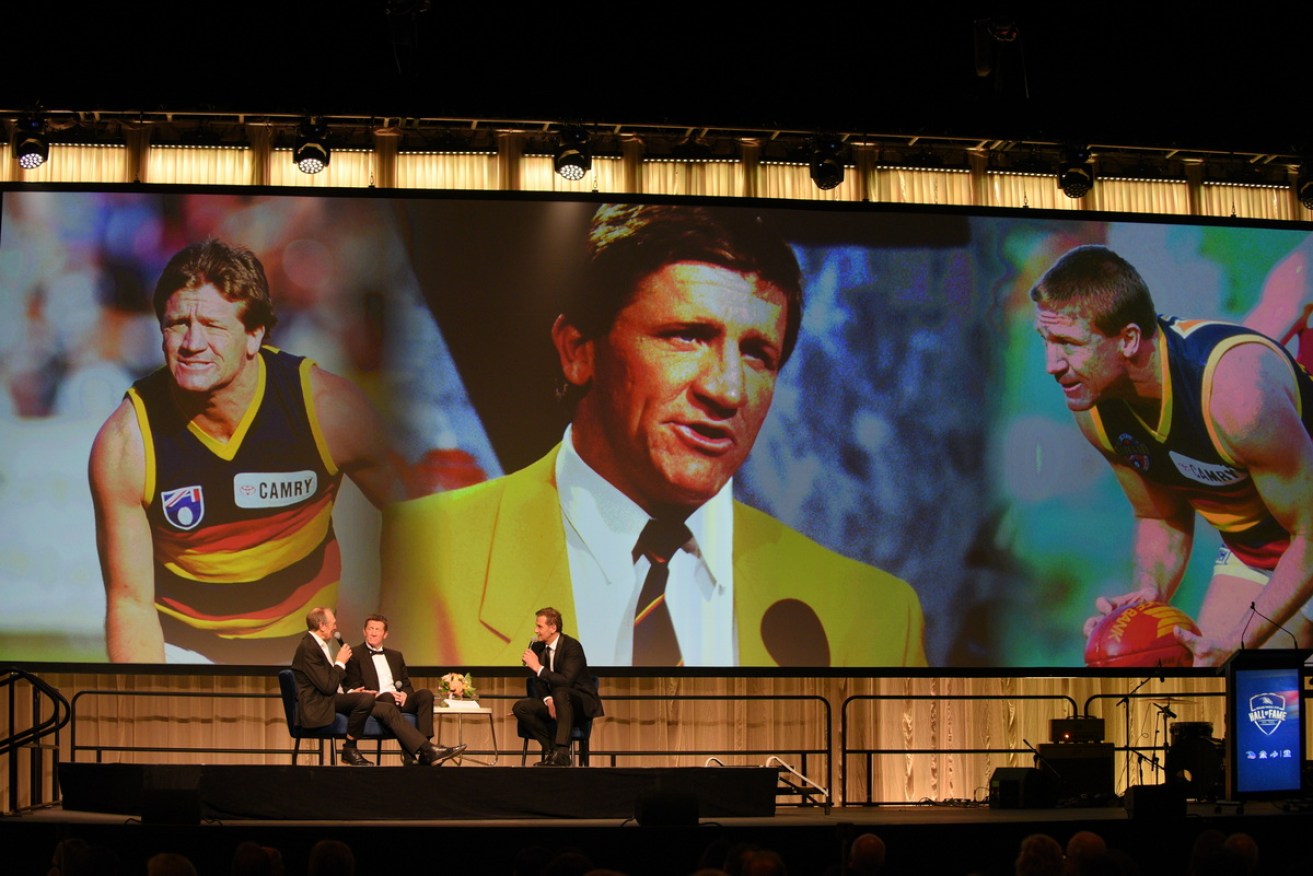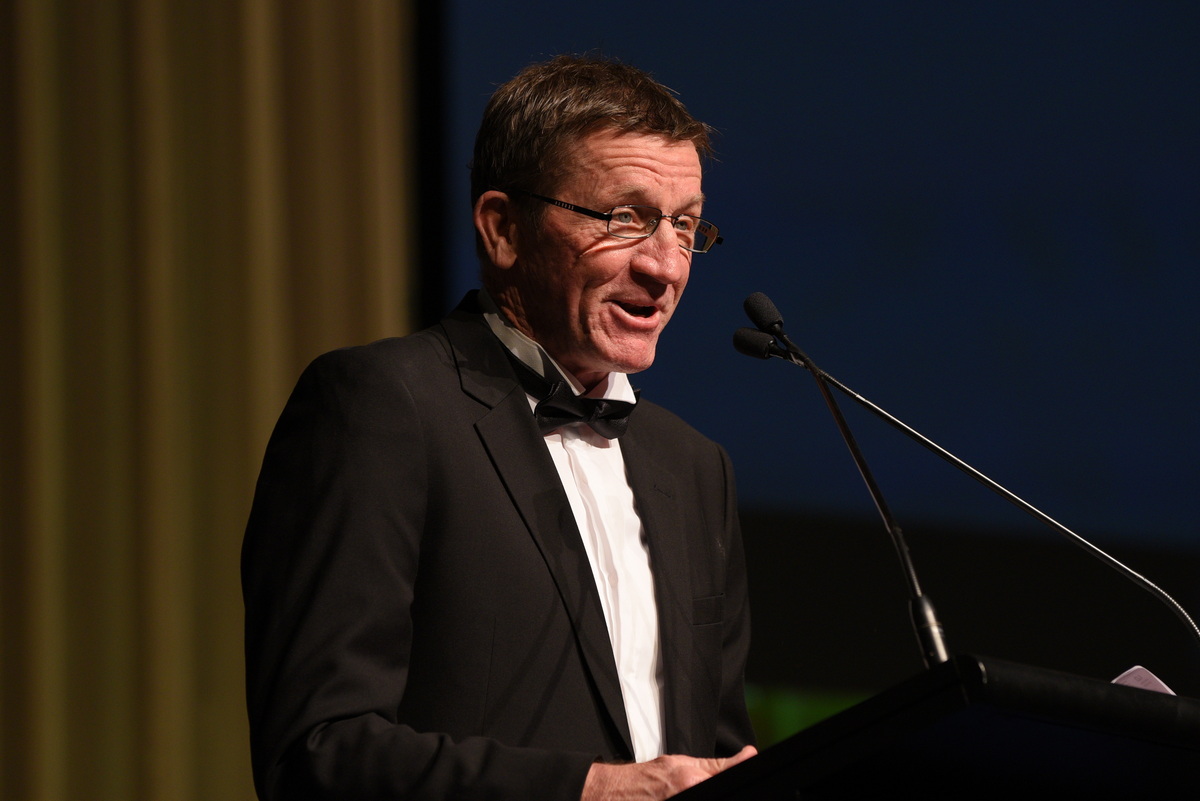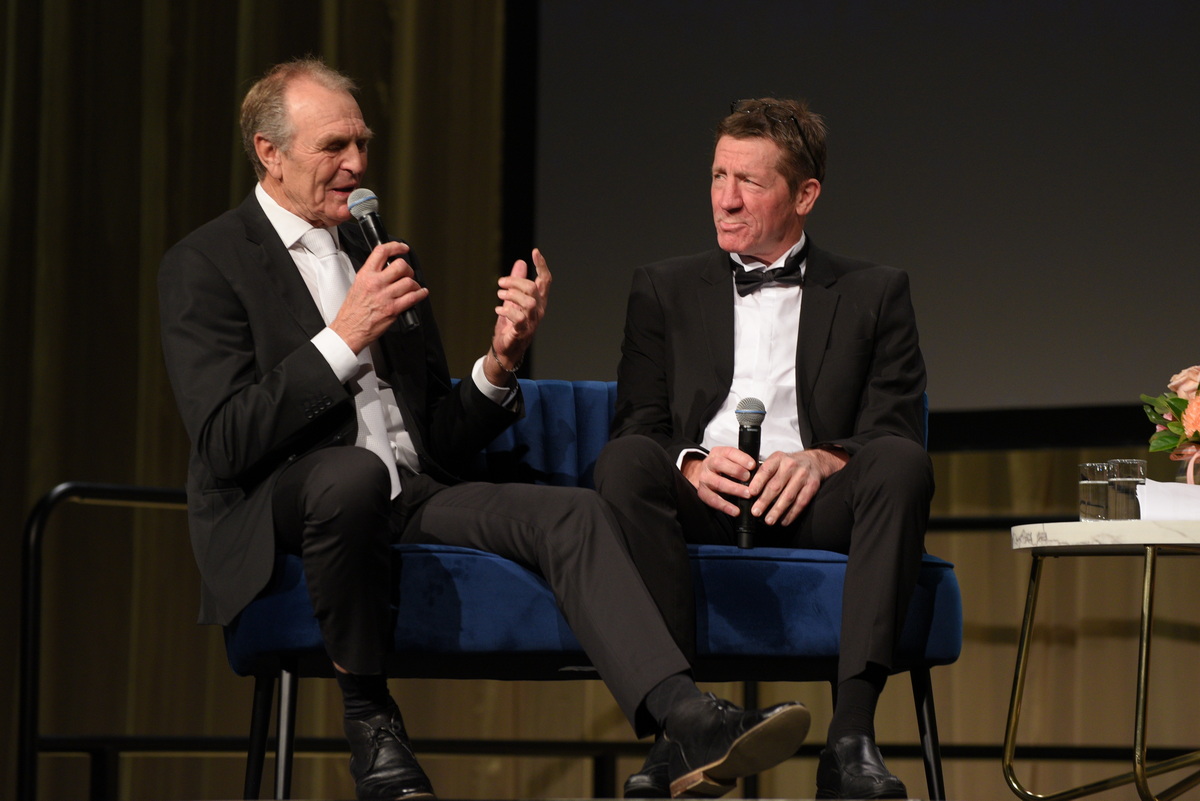Coming in from the cold: Crows re-embrace old heroes
First, Tony Modra. Now, inaugural captain Chris McDermott and soon, Andrew McLeod. The Crows are rebuilding damaged relationships with their brightest early stars. Michelangelo Rucci examines the impact of the split and reconciliation on McDermott.


Chris McDermott at the Crows Hall of Fame ceremony. Photo: Adelaide Football Club
Tony Modra returned from “Coventry” in 2008, when the Adelaide Football Club tweaked its rules to embrace their exiled cult hero with the life membership honour he treasured more than any other trophy.
The 1997 Coleman Medallist as the AFL’s leading goalkicker in home-and-away football was three seasons short of the 10-year qualification criteria – the biggest price, according to Modra, that he paid for his escape to Fremantle after the 1998 season and his costly fall-out with premiership coach Malcolm Blight.
“Life membership at the Adelaide Football Club is very important to me,” says Modra, who missed out on premiership glory in 1997 due to knee injury, and again in 1998 due to the maelstrom with Blight.
Today, with Modra once again deeply entrenched in the Adelaide Football Club as an ambassador, the rewriting of the life membership rules to build a bridge to a club champion remains one of the noblest acts of Bill Sanders’ chairmanship.
And it is a beacon for new chairman John Olsen.
Chris McDermott returned to the Crows fold last week, belatedly becoming the ninth inductee to the Adelaide Football Club Hall of Fame. It’s been 25 years since the inaugural captain was part of the symbolic bloodletting that paved the entry for Blight, the “Messiah” who did take the Crows to the promised land with back-to-back AFL flags.

Chris McDermott at the Crows Hall of Fame ceremony. Photo: Adelaide Football Club
In that quarter century, during which McDermott tried his hand at SANFL coaching at North Adelaide, carved out a media career in radio and newspapers and put his soul into the Little Heroes charity, he was harshly tainted by images of “sour grapes” and “bitterness”.
Inaugural Crows coach Graham Cornes says he faced a similar situation when he was sacked at the end of 1994 and took up a high-profile role across the media, in print, radio and television, making heavy observations on his former club.
“It does take a while to get over it,” adds Cornes of the pain of being rejected. “But my first two years in the media were with Robert Shaw in my old seat (and with Adelaide failing to play finals).
“Chris’ first two years after he was cut were the premiership years … he had no release, nowhere to go to vent.”
The scars only deepened while his work in the media was misrepresented, as noted by McDermott’s final words in his acceptance speech at the Hall of Fame ceremony last week:
“Finally, to you members, the supporters, the sponsors, the staff, the players, past and present, I guess I know I have divided opinion and some of you have made that opinion (known) – and I get it.
“But when you go to the media, you’ve got to go there understanding some are going to like it and some are going to hate it, and you’ve got to cop it.
“And I understood that.
“I will try to explain it from my perspective. What you saw and what you heard is me. That’s just the person I am. When I went into the media, I couldn’t do the fake gig. I had to say what was on my mind, what I thought, like it or lump it; persevere with me or sack me.
“I promised that when I entered (the media) that was the role I would play and none other. So hopefully that explains that.
“I won’t ever apologise and I don’t think I should. Now that it’s over I just wanted to explain and give you the opportunity to accept it or leave it or just not worry about it.
“For me, it was important as this may be the last time I speak to you at this football club. It’s just letting everyone understand where I was coming from. And that is the beauty of this game – we all see it differently; we all verbalise it differently. We don’t have to always agree, but we should respect the right to disagree and do that responsibly.”
McDermott’s closing remarks highlight that in Adelaide a former Crows player seeking a new career in the media is destined to wear one of two labels – “sycophant” or “traitor”. There seems no middle ground in a sport that creates emotional critics of the professional pundits.
McDermott, 57, never wanted to be cast as a cheerleader. And the vitriolic comment fields on his stories, the vicious text messages on the talkback line at radio and the ultras venting on fans’ forums cast him as a villain.
Cornes, who has lived by the mantra of “never complain, never explain”, raises his eyebrows at how McDermott ended his acceptance speech.
“It did not need to be said,” Cornes said this week. “He cleansed, purged his psyche.
“But he did not need to be ‘apologetic’. If you are in the media and see something you don’t like, you need to say it.
“I understand what comes with that – you get smashed if you are a former player calling out your club. That is the price you pay, ask Kane,” adds Cornes referring to his son, the 300-game Port Adelaide premiership hero turned media critic.

Former Crows coach Graham Cornes with former captain McDermott at the Hall of Fame ceremony. Photo: Adelaide Football Club
McDermott told InDaily this week: “I needed to clear the air.”
“When I joined the media, I promised to myself I would not become a mouthpiece for the Adelaide Football Club. It would not be, ‘You will speak the Crows’ way, you will play by our rules, you are one of us and that’s how you are to behave to always be a Crows man’.
“I knew if I started lying or telling anything that was not true, I would trip over. I was going to the media on my terms. I was not going to trip over.
“I’ve put my case up there (on the induction stage).”
McDermott put his position as a “take it or leave it” message to his unforgiving detractors, even the few who remain in powerful seats at West Lakes.
Those who do not appreciate McDermott’s sincerity, carried through 18 years at radio FIVEaa and 31 in print journalism, needed to be a fly on the wall at the now-lost Rowe and Jarman sports store on Grenfell Street midway through the 1994 AFL season. It was the moment McDermott proved to himself how easy it is to “trip over” – in this case to his rawest emotions – as a captain seeking to remain loyal to a decaying club.
Late into a one-on-one interview with McDermott, at a time when it was obvious Cornes was losing the players while the Crows were struggling to follow-up their heady preliminary final run of 1993, the man who had built an enviable image as a tough footballer broke down in tears.
McDermott’s answers, in an era when AFL clubs still had no media managers scripting player responses, were diplomatically correct but factually flawed. Years later, behind the microphone or with his words splashed on a digital screen, he refused to make the same mistake and, as Cornes says, “paid the price”. More so when the Rob Chapman-Andrew Fagan era in command as chairman and chief executive at the Adelaide Football Club brought heavier pain to the Crows’ critics in the media.
One notable example for McDermott was in 2018 with a newspaper column in which he reviewed – without ever endorsing – lawyer Kym Ryder’s platform in a run-off election to the Crows board with the incumbent Rod Jameson, a former team-mate to McDermott both at Adelaide and in the SANFL at Glenelg.
The price, as Cornes puts it, was Jameson – after a terse telephone call with his former captain – sending McDermott to “Coventry”. The fascinating footnote is that Jameson is a former player in the media circle too.
As with Modra, McDermott’s exile is over … almost. Some scars will take more time to heal than others, even while Olsen makes a concerted effort to rebuild bridges with the club’s disillusioned former servants.
McDermott feels he is in the “best spot for 15 years” at the club where, as Cornes recalls, there was no other option during the heady summer of 1990-1991 for the first captain of the AFL’s newest team.
“There was never any doubt Chris would be captain,” said Cornes who quickly discounted experienced pair Bruce Lindsay (by his injury record) and first-year club champion Mark Mickan, who was not in the first line-up that played Hawthorn at Football Park in March 1991.
“It almost goes without saying that Chris had to be our first captain. There was not even a second thought.
“The task of bringing together that group of players – with all the tensions that came from the 1990 season (when Port Adelaide sought an AFL licence) – was a much harder task than people think. And Chris had done it before as State captain.”
With a record of 117 AFL games – from the first of 1991 to the last of 1996 – and honours such as club champion (1992), captain from 1991-1994, the club’s first life membership award (1995) and captaincy of the Crows Team of the Decade (1991-2000), McDermott – just as Andrew McLeod stated of his feelings last year – became uncomfortable at his own club as a consequence of his forthright and frank views as a media commentator.
Today, as the healing begins, McDermott pays tribute to Olsen for easing the tension. His children, 15-year-old twins Fraser and Harper, are a few steps ahead – or, as McDermott put it, “really into the club”. Thankfully, the “sins of the father” do not rest on their shoulders while Olsen is rebuilding Adelaide’s internal culture.
“John was faultless, very welcoming,” McDermott said of Olsen’s “olive branch” that came with warm receptions from Crows coach Matthew Nicks, captain Rory Sloane and new chief executive Tim Silvers at the Hall of Fame dinner last week.
“From his (Olsen’s) first approach there was no ‘You owe us’ or ‘We owe you’ … it was ‘We both need to do better’ and I enjoyed that. No strings attached. No apologies needed.”
McDermott’s life story is one of constant challenges. He was an orphan as a teenager. He overcame the rebellious ways of 1980s footballers to ultimately become a role model at Glenelg and with the South Australian State team. He lived up to the demands of his late mother to honour the heritage of his grandfather, Port Adelaide and State forward Les “Bro” Dayman.
“Chris grew up in Glenelg, barracked for Woodville, but there was that Port Adelaide upbringing with his mother telling him to ‘get up’ and to ‘stop whingeing’ when he was a junior footballer,” Cornes said.
The 1994 moment with McDermott at Rowe and Jarman highlights how two men, Cornes and McDermott, who had shared and endorsed so much together in SANFL campaigns at Glenelg and in State-of-Origin battles with Victoria could ultimately fall out.
“We’ve had a lots of love-hate moments,” admits Cornes.
Season 1994 was one of these difficult moments.
Cornes today recalls his handling of McDermott in that emotional week in 1994 had followed the psychological ploys legendary VFL coach Ron Barassi repeatedly invoked with his team’s on-field leaders.
“Never as brutal, however,” adds Cornes who had a short stint with Barassi at North Melbourne in 1979.
“(Club chairman, the late) Bob Hammond had a cup of coffee with Chris and reported back to me,” Cornes said. “The players’ view was I was training them too hard. That was my privilege. We had to work our way out of the doldrums. I was not stupid about it.
“But they also felt I had gone soft psychologically. I was not blasting players as I once did. I did back off …”
Hammond recommended Cornes reverse the script in the lead-up to an away mid-season clash with St Kilda at Waverley on June 25.
“Pick on the players, and ease the training,” Cornes said. “Against my better judgment, I gave them Tuesday and Thursday off to freshen up.”
The planned psychological treatment with the team leaders was complicated when McDermott woke on match day in Melbourne with flu-like symptoms. He was given until noon to declare his fitness.
“Chris said he was fine – and he needed to be; we were playing him on (future dual Brownlow Medallist) Robert Harvey,” Cornes said.
“After 10 minutes and with Harvey having 10 possessions, I called Chris to the bench. He was not happy,” added Cornes who twice dragged McDermott to the bench during the first half.
“At half-time, I had Bob Hammond’s words ringing in my ears. McDermott, Andrew Jarman and Tony McGuinness were not great defensive players. I called Tony ‘selfish and lazy’.
“I challenged Chris by asking him, ‘How do you expect your team-mates to do the defensive things when you won’t.”
At the end of the game, a draw that left Adelaide languishing in 10th spot, Cornes was still seeing “resentment” in the eyes of his players. The Crows were broken.
Of McDermott, Cornes said: “I felt I’d lost him forever …. that relationship between coach and the leadership group was at breaking point … but time heals everything.”
The healing now extends to McDermott and the club at which he spent six years seeking to build its heart and soul from the inside, and then 19 years trying to protect that foundation from the outside as a media critic.
McDermott has spent two years out of the daily media grind where his seat is taken by the multi-media Kane Cornes who – with even more vigour – tests how far a club hero can push the boundaries in a fickle South Australian football scene.
Sanders put Modra at peace with his club. Olsen has left the door at the Adelaide Football Club once again open to McDermott.
Next? Andrew McLeod. Shaun Rehn.
Olsen’s charter is stretching beyond rebuilding a football team to also save a football club’s foundations.




